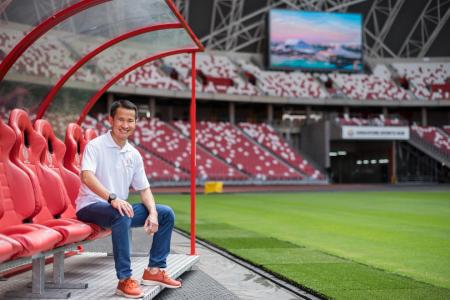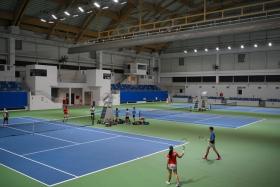A balancing act to make the Sports Hub a part of the Singaporean psyche
When chief executive officer Lionel Yeo began his stint at the Singapore Sports Hub in February 2020, the former Singapore Tourism Board head was fully aware of the challenges ahead.
He couldn't have anticipated, however, the Covid-19 pandemic putting a halt to all international and sporting events at the Kallang venue.
When some 85,000 fans passed through the turnstiles at the National Stadium to catch 16 football matches at the Suzuki Cup last December, it was a sign that things were picking up, and that the Hub was ready to “be relevant” once again.
Yeo, 49, who was STB’s chief from 2012 to 2018, is the fourth man to helm the Sports Hub after Frenchman Philippe Collin-Delavaud (March 2011-December 2015), and Singaporeans Manu Sawhney (October 2015-May 2017) and Oon Jin Teik (January 2018-April 2019).
In an interview with The New Paper last week, Yeo said his starting point for the Hub was to consider it as not just a national project, but a national asset – and a facility that is always relevant to the community.
“The question that’s always on my mind is are we being good stewards of this national asset? And the way we respond to that question is different during the pandemic, because there are certain things we are not allowed to do.
“So in 2020, we asked what we could do for the good of the country, to be relevant to serve Singapore’s interests. Then, Project Dorm (which saw the OCBC Arena and National Stadium transformed to house 3,000 migrant workers to help contain the spread of Covid-19) was the answer.
“Now, it’s about investing in the future and working with organisers to bring back the fans.”
This year’s sporting calendar is already showing signs of things picking up. Feb 25-27 will see an AirBadminton Marathon at the National Stadium, which will be held over 48 hours in a record-setting attempt. Mixed martial arts (MMA) enterprise One Championship is slated to host its 10th anniversary event on March 26, and the HSBC Singapore Rugby Sevens returns the following month.
While Yeo points out that the Sports Hub has been well supported by the Ministry of Culture, Community and Youth, STB and Sport SG, there remains a balancing act to attracting world class events while also adhering to capacity restrictions and safe management measures.
“It has to be scalable, and it has to make economic sense,” said Yeo, adding that the Sports Hub did not take hiring fees for December’s Suzuki Cup.
“We need to get to 25,000 or 30,000 (for the 55,000-capacity National Stadium) and 6,000 to 8,000 for the (12,000-seater) Indoor Stadium. Below these capacities, from a business perspective, it may not make economic sense.
“The promoters will say I would love to bring a concert here, but can I bring 30,000 fans? Because if it's 10,000 fans, the numbers don't work."
Aside from the challenge of balancing commercial interests and the Government's vision for the Hub, Yeo is mindful that the public’s view of the Sports Hub isn't quite on par with the old National Stadium, which hosted the Malaysia Cup, National Day Parades and concerts in the 80s and 90s – and was at the time very much a part of the Singaporean psyche, so to speak. A place, where to this day, many have fond memories of, for a plethora of reasons.
“I think about that all the time,” Yeo said with a smile. “And I always go back to ‘what does project success look like?’
“There are three dimensions to it: policy success, commercial success, and public success… Public success is extremely important because this is their sports hub, and we want them to have wonderful experiences here too.
“Absent the return of large-scale events, for the time being, we are trying really hard to have that community engagement. We work with the NSAs (National Sports Associations) to see how we can help popularise the sport, help their athletes, and so on.
“Last year, we worked with them to profile the athletes that were going to Tokyo (for the Olympics), the first-time olympians. We also made sure the facilities were in place for the athletes to train.
“We want to do more of those things. For example, to be the venue of the finals for A’ division sports – because that’s where and how the schoolboy memories form. It's part of helping Singaporeans understand that the Sports Hub is here for them, and also here for our athletes.
Get The New Paper on your phone with the free TNP app. Download from the Apple App Store or Google Play Store now



